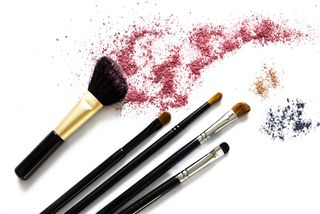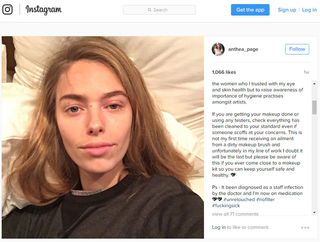Model Contracts Eye Infection from 'Dirty' Makeup Brush

An Australian model who contracted an eye infection from a shared makeup brush is now speaking out about the importance of good hygiene when using makeup or getting your makeup done.
The model, Anthea Page, posted on Instagram that she contracted a staph infection of the eye after getting her makeup done at a fashion show, where the makeup artists did not properly clean the brushes.
"I have just been on a fashion show job for the past 4 days and unfortunately, even though I had observed unhygienic practises and confronted the qualified artists (who I will not name), I still ended up taking home a nasty eye infection from fashion weekend," Page wrote on Instagram.
"My message is not intended to critique the women who I trusted with my eye and skin health but to raise awareness of importance of hygiene practises amongst artists," Page said. "If you are getting your makeup done or using any testers, check everything has been cleaned to your standard even if someone scoffs at your concerns." [7 Beauty Trends that Are Bad for Your Health]

The U.S. Food and Drug Administration warns against sharing makeup brushes, even with a good friend. "Another person's germs may be hazardous to you," the FDA says.
When two or more people share the same brushes or eyeliners, so-called "cross contamination" can occur, meaning bacteria from someone's skin can get on a brush, which could then infect another person, according to the University of Rochester Medical Center.
"The main danger with sharing makeup is passing on an infection like viral conjunctivitis or pink eye," Rochester says.
Sign up for the Live Science daily newsletter now
Get the world’s most fascinating discoveries delivered straight to your inbox.
"It’s a horrible idea," Dr. Doris Day, a dermatologist at Lenox Hill Hospital in New York City, said about sharing brushes. "You shouldn’t share makeup brushes or makeup even," Day said.
If you get your makeup done, you should bring your own tools as well as your own makeup, Day said. Or, you should make sure that the makeup artist is using the products only on you, and is cleaning the brushes in between, she said.
It's important to note that even if an artist is cleaning brushes between clients, a makeup product could still be contaminated if the artist "double-dips" the brush into the makeup when applying the product, Day said. (In other words, the artist applies the makeup to the client, but then dips the brush back into the makeup container, thus contaminating the product in the container.)
Such double dipping can be avoided by placing makeup on a palette to be used for individual clients. "You have to pay attention and be your own advocate," to reduce the risk of infection from getting your makeup done, Day said.
The good news is that infections from sharing makeup are rare, Day said. Makeup products usually have preservatives to minimize contamination. But if a lot of people are using the product at once, which might happen in a fashion show, then the preservative would be less effective, she said.
The risk of contamination is also high with makeup "testers" at stores, in which lots of people use the same cosmetic product, as a way to sample the product before they buy it. If you want to use a tester cosmetic at a store, you should make sure that it is applied with a single-use applicator, such as clean cotton swabs, the FDA says.
People can also get an eye infection from using old makeup due to build-up of bacteria in the container (such as a mascara container). A person may contract a serious eye infection if they scratch the surface of their eye with an infected brush or makeup pencil, according to the University of Rochester. So it's a good idea to replace cosmetics every three to four months, Rochester says.
People should also avoid using eye cosmetics if they have an eye infection or the area around the eye is inflamed, the FDA says. You should wait until the area heels before using eye makeup again.
Page said she is currently on medication for her staph infection.
Original article on Live Science.

Rachael is a Live Science contributor, and was a former channel editor and senior writer for Live Science between 2010 and 2022. She has a master's degree in journalism from New York University's Science, Health and Environmental Reporting Program. She also holds a B.S. in molecular biology and an M.S. in biology from the University of California, San Diego. Her work has appeared in Scienceline, The Washington Post and Scientific American.

